APS Janet Taylor Spence Award for Transformative Early Career Contributions
APS recognizes six psychological scientists pushing the limits of their field with the 2015 APS Janet Taylor Spence Award for Transformative Early Career Contributions. This year’s award-winning research spans an exceptional breadth, encompassing topics such as the overlap of visual perception and action, the evolution of cognition and culture, human collectivism, the neurobiological and behavioral roots of anxiety, cognitive science’s role in education, and the social side of emotions. In the profiles that follow, the six recipients describe their unique research programs.
The Janet Taylor Spence Award is named for APS’s first elected president, who passed away in March. Spence’s transformative research included the invention of a widely used anxiety scale that she developed to test the relationship between anxiety and task performance. Spence also was credited with bringing gender to the forefront of psychological science as a mainstream topic of inquiry. Along with her colleague, Robert Helmreich, Spence developed a series of measures to investigate commonly accepted but untested beliefs about characteristics differentiating the genders and about appropriate roles for men and women in society. “The tenacity, fearlessness, and force of will reflected in [Spence’s] career,” says 2015 Spence Award recipient Jamil Zaki, “are a model for not just how to do science, but also for how to be a scientist.”
The awards will be presented at the 2015 APS Annual Convention in New York, May 21–24.
Jeffrey Karpicke
Cristine H. Legare
Dean Mobbs
Jay J. Van Bavel
Jessica K. Witt
Jamil Zaki
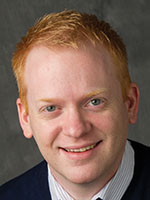 Jeffrey Karpicke
Jeffrey Karpicke
Purdue University
What is the focus of your award-winning research?
Research in my laboratory sits at the interface between cognitive science and education. Our research has been especially focused on the importance of retrieval processes for learning. My goal is to identify effective strategies that promote long-term meaningful learning and comprehension.
How did you develop an interest in this area?
There is a significant need now for research that integrates the theoretical tools and methods from cognitive science with the content and learning goals in education. This is an exciting time to be conducting this research because there is the potential to have an impact both on theoretical ideas about how the mind works and on practical strategies that can be used in educational settings.
Who are your mentors and/or biggest psychological influences?
I have had three outstanding academic mentors: David Pisoni, my undergraduate mentor at Indiana University; Henry (Roddy) Roediger, my graduate mentor at Washington University in St. Louis; and James Nairne, my mentor and colleague at Purdue University. In addition, my father John Karpicke, sparked my interest in the scientific study of learning when I was young. I am extremely grateful to these four people. I am also very fortunate to have several great colleagues and a terrific group of students who have influenced me in many ways.
What unique factors have contributed to your early success?
I think our work has garnered some attention and had some impact because we are attempting to integrate ideas from the cognitive science of learning within research on real-world problems in education. I think the time is ripe for this approach, and learning is something that many people care a great deal about.
What does winning this award mean to you both personally and professionally?
It is a great honor to receive this award and to be recognized as a part of this remarkable group of early career psychological scientists.
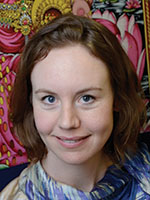 Cristine H. Legare
Cristine H. Legare
University of Texas at Austin
What is the focus of your award-winning research?
My work reflects a strong commitment to interdisciplinary approaches to understanding the development and evolution of cognition and culture. Humans are psychologically prepared to learn from others. They also display a wider repertoire of socially acquired and transmitted beliefs and behaviors that vary more than any other species. Despite the large literature examining what is unique about human social learning relative to that of other primates, much less is known about cultural variability in social learning within our species. I study how humans flexibly respond and adapt to diverse ontogenetic contexts and cultural ecologies. In ongoing work, I am studying how children flexibly use imitation and innovation as dual engines of cultural learning. Examining how our universal cognitive system enables us to use tools, to engage in innovation, and to become members of diverse cultural communities provides unique insight into cognitive and cultural evolution.
How did you develop an interest in this area?
The interplay of the universal human mind and the variation of human culture spark my curiosity and motivate my research program. I’ve spent much of my research time studying and conducting research abroad. I am intrigued by both cultural commonalities and cultural diversities in beliefs and behavior. In my research, I integrate theory and methodology from cognitive and evolutionary anthropology, cognitive and developmental science, and philosophy to examine the interplay of cognition and culture. I have conducted extensive research in southern Africa and am currently conducting research in Brazil, China, the United States, and Vanuatu, a Melanesian island nation in the South Pacific. Vanuatu is one of the most remote, culturally and linguistically diverse, and understudied countries in the world. It provides a unique opportunity to explore the development of cultural learning in communities with limited exposure to Western education and influence. I conduct research in educational, home, and peer environments in both the United States (Austin, Texas) and Vanuatu (Tanna) to increase what is known about the impact of culturally diverse child-rearing environments, child-rearing practices, and social dynamics on the development of cultural learning.
Who are your mentors and/or biggest psychological influences?
The decision to work with my graduate mentor, Susan Gelman, was the best professional decision I have ever made. In our first conversation about potential topics of research, I mentioned that I wanted to integrate theory and methodology from cognitive anthropology and developmental psychology to examine cognitive development in diverse cultural contexts. I had spent a year living in South Africa as an undergraduate and wanted to return to examine how Western biomedical and witchcraft explanations were used to explain AIDS.
When I reflect on this early conversation with Susan, I am amazed that she agreed to let me undertake such an ambitious and complex project as a first-year graduate student. It turned out that her support for this project was characteristic of her longstanding enthusiasm for my research on topics that extend outside of mainstream psychological research (e.g., witchcraft and ritual). Rather than directing me towards more well-established research topics or projects more directly related to her existing research, she gave me the freedom and support I needed to effectively explore the issues that I was most excited about. She assisted me at every stage of the research process, including helping me secure funding to do months of fieldwork in the Gauteng province of South Africa, advising me on experimental design, and guiding me through the academic writing process.
Susan taught me a number of ways of thinking about the field and my career that have proven to be invaluable. She taught me how to be mastery-oriented in my research. She helped me move beyond feelings of frustration when I encountered obstacles, an inevitable part of the scientific process, particularly if you study unorthodox research topics without previously established research literatures and methodological toolkits within your discipline. She helped me learn how to make the topics I am interested in relevant to theoretical questions psychologists recognize as central to understanding human cognition and social behavior. Susan also taught me how to be an independent thinker. High-impact scientific contributions require more than taking what someone else has already done and tinkering with it a bit to get a publication. Instead, it is important to approach old problems in new ways and be willing to challenge conventional ways of thinking and conducting research. I am profoundly grateful for her exceptional mentorship, and for her support of everything I wanted to do — from studying AIDS in South Africa to pursuing an academic career.
My undergraduate mentors, Gail Heyman and Sonja Baumer, have been longstanding sources of support and encouragement. They introduced me to diverse methodologies and theoretical perspectives, inspiring me to pursue a career in psychological research.
Paul Harris, Henry Wellman, and Harvey Whitehouse have been exceptionally supportive mentors and have made highly influential contributions to my professional development and training.
I am also grateful to Joe Henrich, Ara Norenzayan, Alison Gopnik, Paul Rozin, Paul Bloom, Frank Keil, Bruce Hood, Maureen Callanan, Doug Medin, Robert McCauley, Margaret Evans, Tanya Luhrmann, Michael Cole, Deb Kelemen, Amanda Woodward, Art Markman, and David Buss for intellectual inspiration and support of my research program. The success of my research program is due in large part to the mentorship and support of my colleagues. I strive to provide the kind of supportive mentorship I have received to other junior scholars and students.
What unique factors have contributed to your early success?
My undergraduate training in human development and cultural studies at the University of California, San Diego, was highly interdisciplinary. It included coursework in cognitive science, cognitive and psychological anthropology, engineering, and evolutionary biology. The diversity of my undergraduate training has allowed me to approach psychological research from the perspective of multiple scientific disciplines. My research interests often begin outside the traditional boundaries of psychological inquiry. For example, ethnography is full of rich psychological insights about human behavior; I often use ethnographic data to inform the design of my experimental research.
In graduate school, I participated in the Culture and Cognition Program while completing my PhD in developmental psychology at the University of Michigan. The combination of coursework and methodological training in cognitive anthropology and experimental psychology provided me with the diverse tool kit required to conduct research at the intersection of psychology and anthropology.
What does winning this award mean to you both personally and professionally?
This award provides recognition of the scientific value of the kind of interdisciplinary, unorthodox research that I conduct. Interdisciplinary research is the future of social science, and I am honored to be part of this scientific movement.
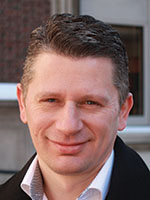 Dean Mobbs
Dean Mobbs
Columbia University
What is the focus of your award-winning research?
My research attempts to answer three broad sets of questions:
- What are the neurobiological and behavioral phenotypes that underlie fear and anxiety? How do we learn to control our fears, and how does this process go awry in anxiety disorders? To answer these questions, my research examines how changing the intensity of threat (e.g., near or far threats) result in switches from slow cortical brain regions to fast midbrain regions involved in fight or flight, how these neural systems mutually inhibit each other, and how the harmony between these circuits predicts optimal or suboptimal expression of fear.
- How can we determine the behavioral and neural signatures of positive social interactions, such as observing why others’ success is rewarding (e.g., vicarious reward and reflected glory), altruism, and empathy. And how do these positive interactions mask seemingly selfish motives that manifest in the form of envy and schadenfreude?
- What is the interplay between social interaction and emotion? For example, how does fear change when we are in a group versus alone? How does the protective value of others reduce our fear?
These questions are embedded in theoretical models developed by my lab as well as in theories from the diverse fields of behavioral ecology, social psychology, evolutionary biology, and affective science.
How did you develop an interest in this area?
Social psychology and affective science are about the everyday experiences we all encounter and about humanity, including what moves us, relationships, and meaning. My interest in these questions was ignited by reading the faultless work of Michael Fanselow, Caroline and Robert Blanchard, Lisa Feldman Barrett, Jaak Panksepp, Joe LeDoux, Liz Phelps, Ralph Adolphs, Brian Knutson, Matt Lieberman, and Naomi Eisenberger. These researchers had a major impact on the development of my research interests and direction. Less obvious influences come from my love of zombie, sci-fi, and end-of-the-world movies. These movies open up interesting questions concerning fear, survival, and what happens to human relationships when society dissolves. Ideas for several published papers have come from watching movies.
Who are your mentors and/or biggest psychological influences?
My biggest influences are my wife, Cindy Hagan, also a cognitive neuroscientist and sounding board for all my research, and my brother, Karl Mobbs, who inspired me to reeducate myself as an adult. Another big influence is Allan Reiss at Stanford University. When I was an RA, Allan put faith in me to run research projects, analyze data, and write up papers. I ended up publishing six first-author papers as an RA, and I am eternally grateful for this opportunity and his support. In graduate school, I was lucky to work with Chris Frith and Ray Dolan — both were wonderful and incisive mentors who further shaped my approach to science. I was also very lucky to have Demis Hassabis as a colleague; without him, my studies would probably look different. My time at University College London was special because I was surrounded by many amazing people including Predrag Petrovic, Henrik Ehrsson, Tania Singer, John O’Doherty, Hakwan Lau, Tom Schofield, Ben Seymour, Christian Ruff, and others. I can’t imagine a more exciting place to learn. At Cambridge, Tim Dalgleish and Andy Calder, both my postdoctoral advisors, played a critical part in the development of my scientific career. Other wonderful colleagues and collaborators include Bernhard Staresina, Michael Ewbank, Adrian Owen, Jess Grahn, Tristan Bekinschtein, and Hidehiko Takahashi. My colleagues at Columbia University have also been a major inspiration, including Kevin Ochsner, who has been a wonderful colleague and friend, as have Walter Mischel, Tory Higgins, Geraldine Downey, Carl Hart, Daphna Shohamy, Nim Tottenham, Valerie Purdie-Vaughns, Janet Metcalfe, James Curley, Francis Champagne, and Sarah Woolley. Finally, I have worked with many amazing students including Oriel FeldmanHall, Rongjun Yu, Owen Footer, Song Qi, Charlotte Prevost, and Ellen Tedeschi. All have inspired me in ways they probably underestimate.
What unique factors have contributed to your early success?
I think it’s my optimism, sheer persistence, motivation when searching for ideas, and the anticipatory excitement of unearthing something undiscovered. The quality of an idea sets the foundation for the tensile excitement and success of the experiment — rarely has a good study started with a bad idea. To use a musical analogy, I see the idea as the song’s melody, the methods as the instruments, and the paper as the lyrics. I have tried to master each of these processes, yet I will always be learning with joy. It is important to note that my experiments are not always successful, and this can be risky — especially prior to tenure — yet playing it safe rarely results in anything interesting. I live by the principle that I would rather be courageous and fail trying than do research that fails to capture the minds of others.
What does winning this award mean to you both personally and professionally?
I do science because I love the creative process where one takes an idea from a simple everyday observation, forms a question, and articulates this question through the scientific method. I am genuinely delighted to win this award, yet I feel lucky enough to be in the position I am in at Columbia University and to work in a field with talented researchers who are at the frontier of new discoveries concerning human nature. How amazing is that?!
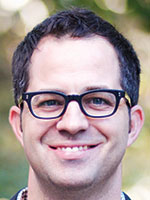 Jay J. Van Bavel
Jay J. Van Bavel
New York University
What is the focus of your award-winning research?
Our research examines how collective concerns — group identities, moral values, and political beliefs — alter people’s perceptions and evaluations of the world around them. We have found that even the most minimal group identities can profoundly influence cognition, shaping everything from our automatic evaluations of others to our perceptions of basic physical properties.
My early work examined how simply assigning people to an arbitrary social group was sufficient to alter face processing and override their automatic racial biases. More recently, we have examined how group identities alter mind perception (e.g., how much humanness is required in a face for it to be perceived as having a mind?), distance judgments (e.g., do people perceive threatening outgroups as too close for comfort?), and basic sensation (e.g., might our group identities shape our senses of smell and taste?) The core theme that emerges across our work is that human cognition is deeply social and highly dynamic.
We take a social neuroscience approach to these issues, blending theory and methods from social psychology, cognitive science, and neuroscience. Studying these issues across multiple levels of analysis offers the promise of more general, process-oriented theories of human cognition and, ultimately, more effective interventions for social issues.
How did you develop an interest in this area?
I have been drawn to group dynamics for as long as I can remember. As a teenager, I was fascinated by the fact that a flip of a coin during a friendly game of football or hockey could transform close friends into bitter enemies. This interest evolved as I was exposed to issues of social justice, and it led me to take a summer job with an organization that fought racism in the education system. I spent countless hours talking about these issues with high school students.
As a first-generation college student, I was slow to catch on to the research mission of universities. But something inside me clicked when I realized that I could study these issues through the lens of psychological science. In a fortunate twist of fate, I made friends with Mike Wohl, and he introduced me to the field of social psychology. My undergraduate mentors, Jeff Schimel and Kim Noels, furnished my passion for studying these issues in a sociocultural context. Looking back, this was probably one of the biggest turning points in my life.
Who are your mentors and/or biggest psychological influences?
Ken and Karen Dion served as my mentors during my first year at the University of Toronto. I’ll never forget my very first day of graduate school, when Ken told me that our fates were forever intertwined and that every success of mine was a success of his (and vice versa)—that lesson has permeated all of my collaborations. Tragically, Ken passed away after my first year of graduate school, and Wil Cunningham took me under his wing. Wil’s infectious enthusiasm, openness to new ideas, and commitment to scientific rigor are continuous sources of inspiration for me. Our fates remain intertwined to this day.
I followed Wil to Ohio State University for the last 2 years of my PhD, and I had to complete most of my degree requirements (e.g., dissertation proposal, orals) in conference hotel lobbies. It was the only place I could round up my dissertation committee (Jordan Peterson, Alison Chasteen, Adam Anderson, and later Mickey Inzlicht). At Ohio State, I was able to learn from several of my idols, including Marilynn Brewer, Russ Fazio, Julian Thayer, and Rich Petty. I was incredibly fortunate to land a faculty position at New York University, and it has been thrilling (and humbling) to work closely with scientists like John Jost, Liz Phelps, and Dave Amodio and receive regular support and advice from my senior colleagues.
What unique factors have contributed to your early success?
Science is a collective endeavor, and I have benefitted immeasurably from the counsel of wise mentors, brilliant collaborators, and talented students. I took the desk next to Dominic Packer on my first day of graduate school. After he overcame his initial aversion to my goalie equipment (which I stored in our office), we became the best of friends and collaborators. I have also had the benefit of several friends, lab mates, and colleagues who have given me honest advice and constructive criticism at every step. In particular, I have a cohort of seriously talented junior faculty at NYU and we have grown up together over the past few years.
Since arriving at NYU, I have had a parade of creative young scientists in my lab. Tobias Brosch, Jenny Xiao, and Jill Swencionis initially joined the lab and helped establish a culture of excellence and congeniality that carries on to this day. At this point, the majority of my papers are the product of talented PhD students or postdocs (see recent papers by Ana Gantman, Amy Krosch, Leor Hackel, Hannah Nam, and Oriel FeldmanHall). Working with such passionate students is by far my favorite part of the job. I have to work incredibly hard just to keep up with them.
What does winning this award mean to you both personally and professionally?
This award embodies my deepest values as a scientist — it is hard to imagine a greater honor. As a social psychologist, this award has also encouraged me to reflect on all the people who have offered support, shaped my thinking, or contributed to my work in some way. The fact that I have never published a sole author paper is a testament to the fact that nothing I have done can be fully attributed to me. I have mentioned dozens of people here, and yet this only scratches the surface.
People love the narrative of the heroic individual scientist, but the most groundbreaking science these days is often the product of large, interdisciplinary teams. We need to move beyond this outdated paradigm and find ways to recognize great research groups and the selfless individuals who work behind the scenes to promote the success of others. In my own small way, I hope that mentoring the next generation of scientists will help pay forward the support that I have received along my own journey. I want to challenge and support them to make transformative contributions to the field.
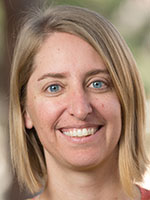 Jessica K. Witt
Jessica K. Witt
Colorado State University
What is the focus of your award-winning research?
My research demonstrates that spatial vision is biased by action. Specifically, the way people perceive the spatial layout of the environment is influenced by their ability to act. Softball players who are hitting better than others see the ball as bigger. Objects that have been brought within reach using a reach-extending tool look closer than those brought within reach by other means. Balls appear faster when they are more difficult to catch than when they are easy to catch. I have found these action-specific effects in a range of perceptual properties such as distance, size, slant, shape, height, and speed, and using a variety of perceptual measures including verbal reports, visual matching tasks, action-based measures, and indirect measures. This body of research challenges the notion that vision is independent of action. Even when the optical information is the same, target objects look different depending on the perceiver’s intentions and abilities.
How did you develop an interest in this area?
Originally a computer science major, I was captivated by a course in artificial intelligence, which led me to take several courses on cognitive psychology and cognitive science. Then, two students from Denny Proffitt’s lab gave job talks at Smith College, and I became hooked on perception–action research. My love for this research is driven, in part, by my own experiences as a collegiate, national, and international athlete. I find my mental processes to be deeply connected to the movements and functioning of my body. These two facets of my life — academia and athletics — continue to fuel each other and further advance my interest in embodiment and perception–action research.
Who are your mentors and/or biggest psychological influences?
I have benefited from the mentorship of so many people throughout my career. My graduate advisor, Denny Proffitt, had an enormous influence on me both professionally and personally, and I would not be the person I am today without him. Bill (William) Epstein pushed me with the kind of frank honesty that hurts but that I also value, while Dan Willingham helped rebuild my confidence. My colleagues Jim Nairne and Robert Proctor at Purdue University helped me navigate the tumultuous waters I faced during my first years as a professor as I continued to do controversial research that brought criticisms from colleagues near and far. I would not love my job as much as I do today without all the support I received from these wonderful mentors.
What unique factors have contributed to your early success?
Over the course of my young career, I have benefited from a willingness to listen to and react to my biggest critics. This has presented many challenges to my research and, at times, my confidence. However, in every instance, these challenges made me a stronger researcher and pushed my boundaries as I continued to make significant contributions to the field. In addition, I attribute much of my success to my resilience to setbacks in my own research. Null and unexpected results can be quite discouraging and lead to much self-doubt, but I have been able to persevere through these moments of insecurity. In fact, many of my favorite findings were driven by initial results that did not meet my expectations.
What does winning this award mean to you both personally and professionally?
Winning this award is a humbling experience. I started college as a “dumb jock” who benefited from a soccer coach who had enormous sway with admissions. When my father saw my name listed under those who had achieved highest honors with their senior research, his initial reaction was surprise that there was another student named Jessica Kate Witt. For my father to watch me receive an award from an organization as incredible as APS in New York City means so much to me. On a professional level, I am enormously grateful to have my efforts and my research field be recognized and valued by psychology’s leading association.
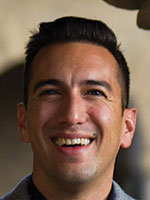 Jamil Zaki
Jamil Zaki
Stanford University
What is the focus of your award-winning research?
Emotions are interpersonal. When a person feels something, this often sparks a fundamentally social chain of events. People express themselves to someone else, that other person empathizes (or fails to empathize), and the empathizer does something (or doesn’t), for instance by helping the “empathizee.” I study this sequence, using techniques that span neuroscience, physiology, social psychology, and behavioral economics. Most recently, I’ve become fascinated by two questions within the world of social emotion. First, what motivates people to approach or avoid empathizing with others? Second, what, if anything, does the science of empathy tell us about increasing empathy — especially in cases where it is badly needed but sometimes missing, such as intergroup settings, schools, and medical practices?
How did you develop an interest in this area?
My mother is from Peru, and her mother moved from Peru to live with us when I was about 8 years old. My grandmother was an incredible woman who made the most important decisions of her life based on what would benefit others, not what was best for her. She was the most empathic person I’ve ever known, and living with her made me fascinated with people’s ability for selflessness. A second big influence was reading Oliver Sacks’ An Anthropologist on Mars during high school and realizing that so much of who we are — from color perception to moral judgments — resides somewhere in the 3 pounds of Jell-O inside our skulls. Twenty years later, neuroscience pervades our culture and this insight seems obvious, but at the time it blew my 15-year-old mind. As a college student, I hoped to combine these interests by studying empathy in the brain. My first neuroscience professor told me this was a naïve goal because empathy requires two people and an fMRI scanner can only fit one. That was disappointing at the time, but since then I’ve wised up.
Who are your mentors and/or biggest psychological influences?
Kevin Ochsner, my graduate advisor, is a mentor like none other. I was severely undercredentialed when I applied to work with him, and to boot wanted to work on something outside of his main line of scholarship. Nonetheless, he took a chance on me and spent hour after hour helping me shape my thinking, science, scholarship, and communication. Those conversations — as well as regular meetings with my wonderful coadvisor, Niall Bolger — were more than discussions about research. They helped me understand and build my identity as a psychological scientist. In the years since, Kevin and Niall continue to be hugely valuable mentors and friends. I will never be able to sufficiently thank them for all they did for me.
A second enormous force in my professional development is Jason Mitchell, my good friend and postdoctoral advisor. For years before we formally collaborated, Jason was an intellectual “big brother” who helped me realize how fun it could be to just sit around wondering about how people work. His curiosity and clarity of mind inspired my thinking countless times.
Many other people — across stages of my career and across universities — have shaped the way I think about empathy, emotion, and science, and have supported me at every turn. In particular, I want to thank Geraldine Downey, Jen Bartz, Lisa Feldman Barrett, Carol Dweck, James Gross, and Ian Gotlib.
What unique factors have contributed to your early success?
One practical thing that has helped me enormously along the way — and which I’d suggest to the next generations of psychological scientists — is cultivating a deep enjoyment of writing. During and after college I hoped to be a novelist, and I churned out hundreds of pages of fiction. The snag in that plan was that I was no good at writing fiction, and so failed with utter totality at that pursuit. But that failure was more than worth it, because now I love writing about psychology, both for our field and for people outside of it. Communication is a psychological phenomenon at its core, and relishing not only doing science but also describing it through writing makes this job more fun for me.
More importantly, though, my or any other individual’s success is truly the result of the people he or she has around them. In addition to my mentors, I now benefit enormously from my own advisees. The best thing about starting my own lab is the incredible energy and fount of ideas these folks provide. Most of the time I just try to stay out of their way! I owe an enormous debt to all of them. In addition to “vertical” colleagues such as advisors and advisees, my “lateral” colleagues and friends have been enormously supportive, inspiring, and fun partners in crime as we’ve enjoyed the highs and wrestled with the lows that come with working in this field. I’d especially like to thank Lauren Atlas, Adam Waytz, Diana Tamir, Ethan Kross, Yarrow Dunham, Kateri McRae, Lexi Suppes, Jared Van Snellenberg, Julie Spicer, Joe Moran, June Gruber, Leah Somerville, Mina Cikara, Jon Freeman, Jay Van Bavel, and Kristen Lindquist.
The single biggest reason for my success, however, is the unflinching support of my wife, Landon Fuhrman Zaki. A wonderful clinical psychologist, Landon has inspired my thinking at many points. She’s also been there for me through all the sacrifice and struggle that come with being an academic, and has lent me her strength more times than I can remember.
What does winning this award mean to you both personally and professionally?
Two things shook me (in a good way) after I learned about this award. The first is the list of past recipients. These amazing scientists have inspired me many, many times, and sharing this recognition with them makes me happy beyond words. The second is the life and legacy of Janet Taylor Spence herself. In addition to pioneering research, Spence ran into — and broke down — gender barriers in science time and time again. The tenacity, fearlessness, and force of will reflected in her career are a model for not just how to do science, but also for how to be a scientist. To be associated with her is truly an honor.





APS regularly opens certain online articles for discussion on our website. Effective February 2021, you must be a logged-in APS member to post comments. By posting a comment, you agree to our Community Guidelines and the display of your profile information, including your name and affiliation. Any opinions, findings, conclusions, or recommendations present in article comments are those of the writers and do not necessarily reflect the views of APS or the article’s author. For more information, please see our Community Guidelines.
Please login with your APS account to comment.